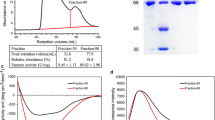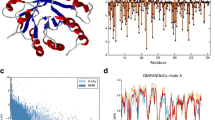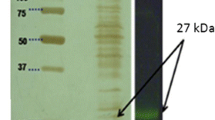Abstract.
The thermostable cellulase Cel12A from Rhodothermus marinus was produced at extremely low levels when expressed in Escherichia coli and was cytotoxic to the cells. In addition, severe aggregation occurred when moderately high concentrations of the enzyme were heat-treated at 65 °C, the growth optimum of R. marinus. Sequence analysis revealed that the catalytic module of this enzyme is preceded by a typical linker sequence and a highly hydrophobic putative signal peptide. Two deletion mutants lacking this hydrophobic region were cloned and successfully expressed in E. coli. These results indicated that the N-terminal putative signal peptide was responsible for the toxicity of the full-length enzyme in the host organism. This was further corroborated by cloning and expressing the hydrophobic N-terminal domain in E. coli, which resulted in extensive cell lysis. The deletion mutants, made up of either the catalytic module of Cel12A or the catalytic module and the putative linker sequence, were characterised and their properties compared to those of the full-length enzyme. The specific activity of the mutants was approximately three-fold higher than that of the full-length enzyme. Both mutant proteins were highly thermostable, with half-lives exceeding 2 h at 90 °C and unfolding temperatures up to 103 °C.
Similar content being viewed by others
Author information
Authors and Affiliations
Additional information
Received revision: 25 October 2000
Electronic Publication
Rights and permissions
About this article
Cite this article
Wicher, .K., Abou-Hachem, .M., Halldórsdóttir, .S. et al. Deletion of a cytotoxic, N-terminal putative signal peptide results in a significant increase in production yields in Escherichia coli and improved specific activity of Cel12A from Rhodothermus marinus . Appl Microbiol Biotechnol 55, 578–584 (2001). https://doi.org/10.1007/s002530000559
Received:
Accepted:
Issue Date:
DOI: https://doi.org/10.1007/s002530000559




